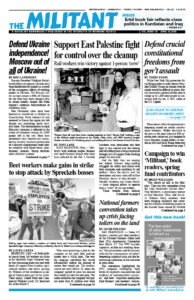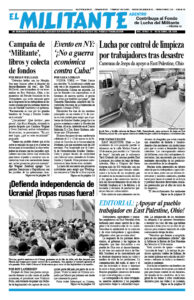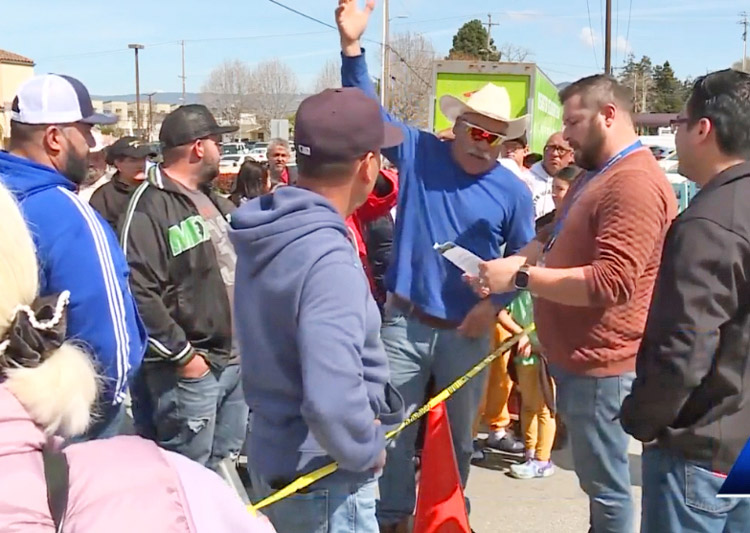WATSONVILLE, Calif. — “They don’t care about us.” This is how farmworker Jose Narvaez summed up the attitude of governmental agencies responsible for the unfolding social disaster after the flooding of Pajaro, just south of Watsonville, where many farmworkers live.
“My two brothers and I have been sleeping in my truck,” he told Socialist Workers Party members visiting the area March 11. “All I have are the clothes I’m wearing. People have lost their cars, everything. We need aid, NOW!”
Water poured into the town March 11 after a levee holding back the Pajaro River failed. For decades, authorities have known the levee was not going to hold in the face of severe storms, yet they did nothing to reinforce it.
SWP members met Narvaez and other evacuees who were gathered at the foot of a bridge connecting Watsonville to Pajaro. They were waiting for the go ahead to be able to cross over and see what was left of their homes and belongings. Many remembered being evacuated from Pajaro in 1995, when two residents lost their lives in a similar flood. Finally, last year a proposed date for the repair was set, but for 2025.
Hundreds of the 2,800 residents of Pajaro have been crammed into a shelter at the county fairgrounds while others have spent nights in cars, sheds or paid for hotel rooms with the little money they had or could borrow.
Barbara Padilla, who works with the organization Puentes de la Communidad, said churches, small businesses and working people in the community have brought food, clothes and other necessities. At the bridge, people line up to receive food from a local meat market. When we visited the fairgrounds, a mariachi band was playing in solidarity with evacuees.
The rich agricultural valleys around Watsonville and nearby Salinas produce a significant percentage of the strawberries, lettuce and other vegetables consumed nationally. Now fields are inundated or too wet and muddy to be worked. Farmers are losing crops and farmworkers have had their work hours reduced or cut entirely.
Heated town hall meeting
Almost no aid has come from the state or federal governments. At a heated town hall meeting March 20 at the fairgrounds, angry evacuees berated county officials and emergency personal for refusing to give them information or financial aid.
The only assistance available to some residents was from the $300,000 the state had allocated to the Monterey County United Way three years ago for COVID relief. It is now being made available, but only for farmworkers. One worker said that her assistance, a $600 debit card, would not arrive for two or three more weeks.
Organizers tried to shut down the meeting when many residents still wanted to speak their mind. Workers surrounded officials asking for updates, demanding to know when they would be allowed back into Pajaro.
Under pressure, evacuation orders were lifted a day earlier than expected, allowing people to begin to clean up and take stock of their losses.
They found houses and businesses damaged, with some red-tagged as unsafe to occupy. Belongings were destroyed, mud was everywhere, with no clean water or functioning toilets. Residents say they need help with removing sludge and moving furniture.
Going door to door in Watsonville, we shared copies of the Militant that had news about East Palestine, Ohio. Working people there have also been treated with contempt, this time by the Norfolk Southern rail bosses and government authorities after toxic chemicals were released in a completely preventable train derailment.
Farmworker Maria Vigil invited us in for hot chocolate when we described the outcry of East Palestine residents that forced the rail bosses to back down on steps to get the trains running as quickly as possible, instead of first removing the contaminated soil that is under the tracks.
We said workers in Watsonville can help fellow working people by demanding aid for the evacuees in Pajaro. Unemployed farmworkers could be given jobs to help residents with the cleanup.
Vigil is from a family of farmworkers and has been able to get unemployment insurance. But, she said, many workers lack the necessary immigration papers to do so. We said it’s crucial for the union movement to get behind the fight for amnesty for workers without papers and to fight for aid to be given to all evacuees, regardless of status.
We talked with Alex Parra, whose mother is a farmworker, about struggles of strawberry workers here in previous decades to win recognition for the United Farm Workers, struggles that showed the capacities of working people to join together to fight for what we need.
The levee in Pajaro wasn’t fixed because the federal Army Corps of Engineers prioritizes funding of construction projects according to the value of the land involved. Levees in affluent areas where land is higher priced have gotten funded while the needs of workers who live on cheaper land have been discounted. “For the rich, it’s all about the dollar,” Parra said.
There are 1,758 levee systems throughout California. Many need repair. Because it’s working people who live on flood plains where housing is cheaper, workers have borne the brunt of the flooding that has accompanied this year’s strong winter storms.
Working people can’t rely on the bosses and their two big political parties to ensure that basic precautions are put into place to prevent flooding and social disasters. To meet the needs of the toiling majority, workers need to organize independently to fight for our own class interests, to build unions, to ally with working farmers and win solidarity.


